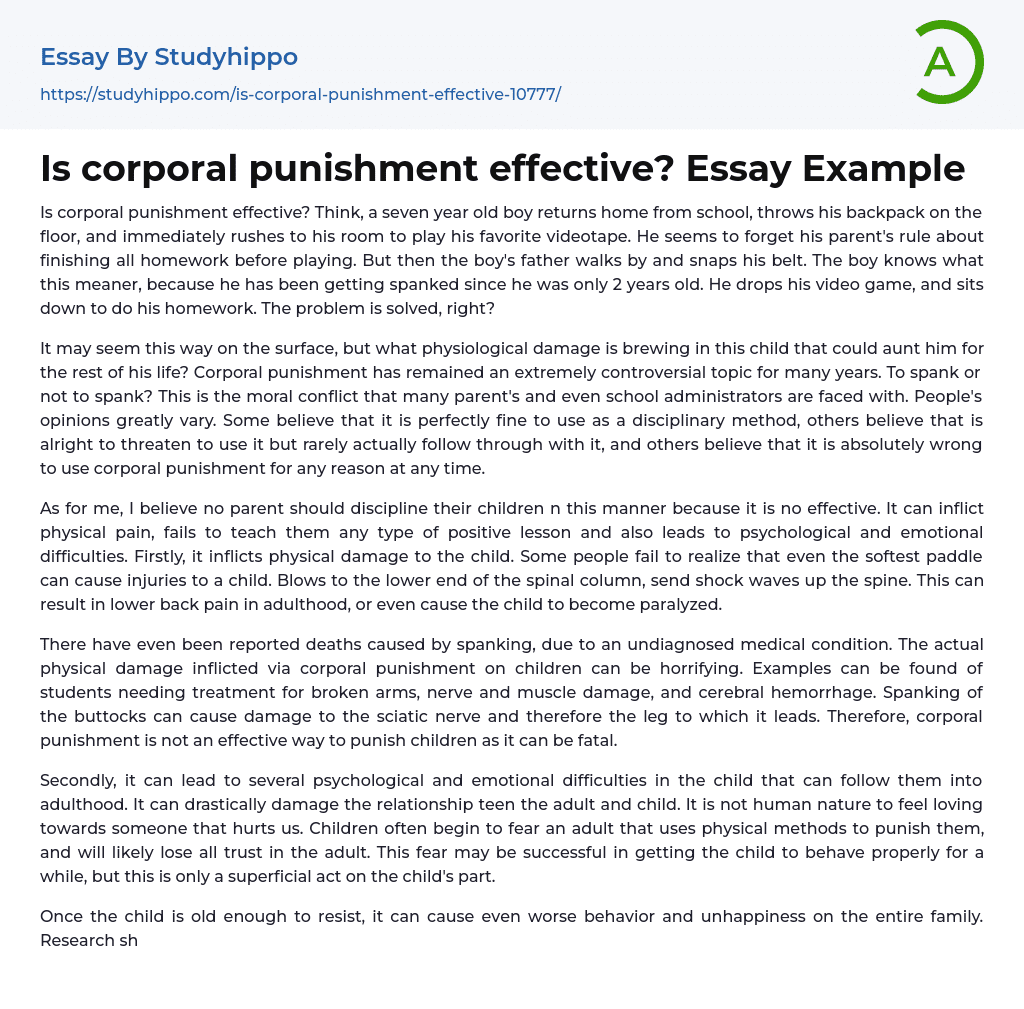The use of corporal punishment as a disciplinary method is a topic of debate. Consider the following scenario: a seven-year-old boy neglects his homework and plays video games after school. However, when his father snaps his belt, the boy knows it's time to stop and do his homework. While this may seem like a quick solution, the long-term effects on the child's well-being are uncertain.
The debate surrounding corporal punishment has persisted for years, creating a moral conflict for parents and school administrators alike. Opinions vary greatly on whether physical discipline should be used as a teaching method or only threatened but rarely implemented. Conversely, many argue that any form of corporal punishment is fundamentally wrong.
Personally, I firmly believe that parents should avoid using physical means to discipline their children due to its l
...ack of effectiveness. Not only does it cause physical pain but also fails to impart positive lessons and can lead to psychological and emotional difficulties in the long run.
Firstly, employing corporal punishment inflicts physical harm upon the child. Some people underestimate the potential harm caused even by gentle paddling on a child.
The physical and psychological impacts of corporal punishment on children can have severe consequences. Blows to the lower part of the spine can result in shock waves, leading to long-term back pain or paralysis. In some cases, spanking has even caused death due to undiagnosed medical conditions. Moreover, corporal punishment can cause a variety of injuries such as broken arms, nerve and muscle damage, and cerebral hemorrhage. It also poses risks to the sciatic nerve and the affected leg, emphasizing its unsafe nature.
In addition to these physical effects,
corporal punishment also leaves lasting psychological and emotional scars on children that persist into adulthood. This damages their relationship with adults who inflict pain upon them and erodes trust. Although this fear may temporarily improve behavior during childhood, it is merely superficial as children grow older and become more resistant. Ultimately, physical punishment can lead to further problematic behavior and overall unhappiness within the family unit.
Research shows a correlation between physical punishment and an increase in felony crimes, antisocial behavior, and aggression among children. Additionally, it diminishes the quality of parent-child relationships while negatively impacting children's mental health.Moreover, adults who were subjected to physical punishment in their childhood are more prone to mistreating their own children or spouse and engaging in criminal activities. Although some experts endorse corporal punishment as an efficient means of disciplining unruly children, it is evident that this practice ultimately leads to psychological and emotional issues later in life. Contrary to the belief that corporal punishment cultivates more civilized individuals, it is evident that offensive language usage and assaults against teachers have become prevalent occurrences in many schools today. While there might be situations where punishments like Singapore caning could be advantageous within our judicial system, it is crucial to recognize that corporal punishment fails to convey any positive lessons to the child but instead often leaves them bewildered, ashamed, angry, and seeking revenge.
In lieu of solely focusing on the child's wrongdoing or how future problems can be prevented, a more effective approach would involve sitting down with the child and discussing their mistakes while collaboratively working towards finding a solution. Research has demonstrated that Grade 1 children attending non-punitive schools
achieved significantly higher scores than those attending punitive schools.The research findings indicate that using punitive discipline, such as physical punishment, may lead to immediate compliance but hinder the internalization of rules and standards. Therefore, it is strongly advised against parents using physical punishment to teach children as it can negatively affect their self-control, behavior modification, learning from mistakes, and overall well-being. These approaches are ineffective in teaching valuable lessons and can cause both physical pain and psychological/emotional challenges.
- Mass Incarceration essays
- Child essays
- Child labor essays
- Childcare essays
- Affirmative Action essays
- Assisted Suicide essays
- Capital Punishment essays
- Censorship essays
- Child Labour essays
- Child Protection essays
- Civil Rights essays
- Corporal Punishment essays
- Death Penalty essays
- Empowerment essays
- Euthanasia essays
- Gay Marriage essays
- Gun Control essays
- Human Trafficking essays
- Police Brutality essays
- Privacy essays
- Sex Trafficking essays
- Speech essays
- Animal Cruelty essays
- Charles Manson essays
- Crime Prevention essays
- Crime scene essays
- Criminal Justice essays
- Criminology essays
- Cyber Crime essays
- Damages essays
- Detention essays
- Distracted Driving essays
- Drug Trafficking essays
- Drunk Driving essays
- Forensic Science essays
- Gang essays
- Hate Crime essays
- Homicide essays
- Identity Theft essays
- Juvenile Crime essays
- Juvenile Delinquency essays
- Juvenile Justice System essays
- Law Enforcement essays
- Murder essays
- Organized Crime essays
- Penology essays
- Piracy essays
- Prison essays
- Property Crime essays
- Prostitution essays




